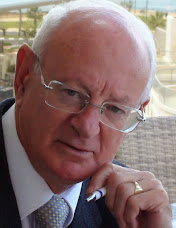The Massachusetts governor, Deval Patrick, was recently in
Israel. No great news, but what he was here for demonstrates, in a micro
manner, why BDS is fighting a losing battle.
One of the reasons he came was to lay the cornerstone for a
future water treatment facility in the Israeli town of Raanana. It will be
built by the Massachusetts-based Israeli firm, Desalitech, in conjunction with
the Israeli Water Authority.
Patrick said, “Israel represents one of the strongest
water technology sectors in the world, and we want to learn from you.”
That message encapsulated why BDS has no chance of
inflicting serious economic damage on Israel. Their anti-Israel campaigns, at
the end of the day, imperils the quality of life of everyone in the developed
and underdeveloped world that benefit from Israeli innovation and technology.
Their actions, should they success, would be a hindrance to progress in our
modern world. The need for knowledge and
sharing Israeli ingenuity drives the Israeli economy, and everyone wants a
share of that pie.
As Patrick said, in a press conference, “Much of the
recent growth and organization in the Massachusetts water-tech sector is the
direct result of our trade mission to Israel in 2011.” That is why I bumped into a Japanese
delegation while visiting the Israeli Chamber of Commerce recently. This is a
common, almost daily, revolving door experience for Israel.
Two hundred Israel companies have raised over $693 million
in venture capital funds in the past three years in Massachusetts alone. Most
of that state’s economic growth, which is two and a half times the US average,
comes from the innovations sector such as biotech, life sciences, clean tech,
digital technologies, which are parts of Israel’s strength.
EMC is an American multinational company based in
Massachusetts that provides cloud computing and IT storage on a global scale.
It’s senior vice president, Joel Schwartz, said that “EMC as a company would
not exist without our ties to Israel.” He divulged that Israeli technology
helped EMC to grow from a $50 million in 1990 to a $9 billion a decade later.
Another Israeli success in Massachusetts was XtremIO. This
start-up bought two years ago by EMC for $400 million despite having no
revenues is poised to bring in a quarter billion dollars this fiscal year.
Massachusetts is a microcosm of what is going on globally
for an Israel that has everything in place to launch massive future trade ties
with Asian giants, China, India, and Japan.
That is why, when placed in the real perspective of trade relationships
and results based on Israeli ingenuity and innovation, which is in high demand globally, BDS
activists are a noisy bunch whose efforts do not amount to more than a minor
pin prick on Israel’s economic skin.
BDS attempts to damage Israel economically. One such method
is an attempt to persuade commercial companies from doing business with Israel.
In an effort to delegitimize Israel as a human rights abuser they try to impose
“corporate social responsibility”
on companies working over the Green Line, by mounting boycott campaigns
against them. Their claim is based on blaming these companies of aiding in the “occupation”
of the Palestinians. However, even if their claim of “occupation” can be
proven to be correct, it is the duty of any occupying power to maintain and
improve the condition of the population of the occupied territories under
international law. Therefore, in the case of Israel, there is a healthy case to
be made by companies like SodaStream and
Ahava, that employ hundreds of Palestinians, that they are indeed helping to
improve the living conditions, and quality of life, of people living within the
“occupied” territories.
BDS is hyper active in attempting to foil tenders to mass
transport company Veolia that helped build the Jerusalem light rail system.
They use the excuse that their rail line travels into the eastern part of Jerusalem,
which they consider to be “occupied territory.” Israel is not an occupying power. This accusation is a misinterpretation of the Geneva Convention, as proven by several notable jurists. But even if it were, in
international law, an occupying power is committed to provide access, roads,
and transport to the people living under occupation, and Veolia’s transport
system is a perfect example of human rights being served and international law
honored. Not only did they provide work to hundreds of Palestinians, they
constructed an efficient, modern, mode of transport for them to travel from
their homes into Jerusalem and beyond. In
Jerusalem, Veolia proved to the world that it indeed has a corporate
social responsibility, despite the bleating efforts of BDS.
Barry Shaw is the special consultant on delegitimization
issues to the Strategic Dialogue Center, Netanya Academic College. He is the author of ‘Israel Reclaiming the
Narrative.’ www.israelnaarative.com Also available on Amazon and AuthorHouse.
https://www.youtube.com/watch?v=-03NII2owL4&feature=youtu.be


No comments:
Post a Comment